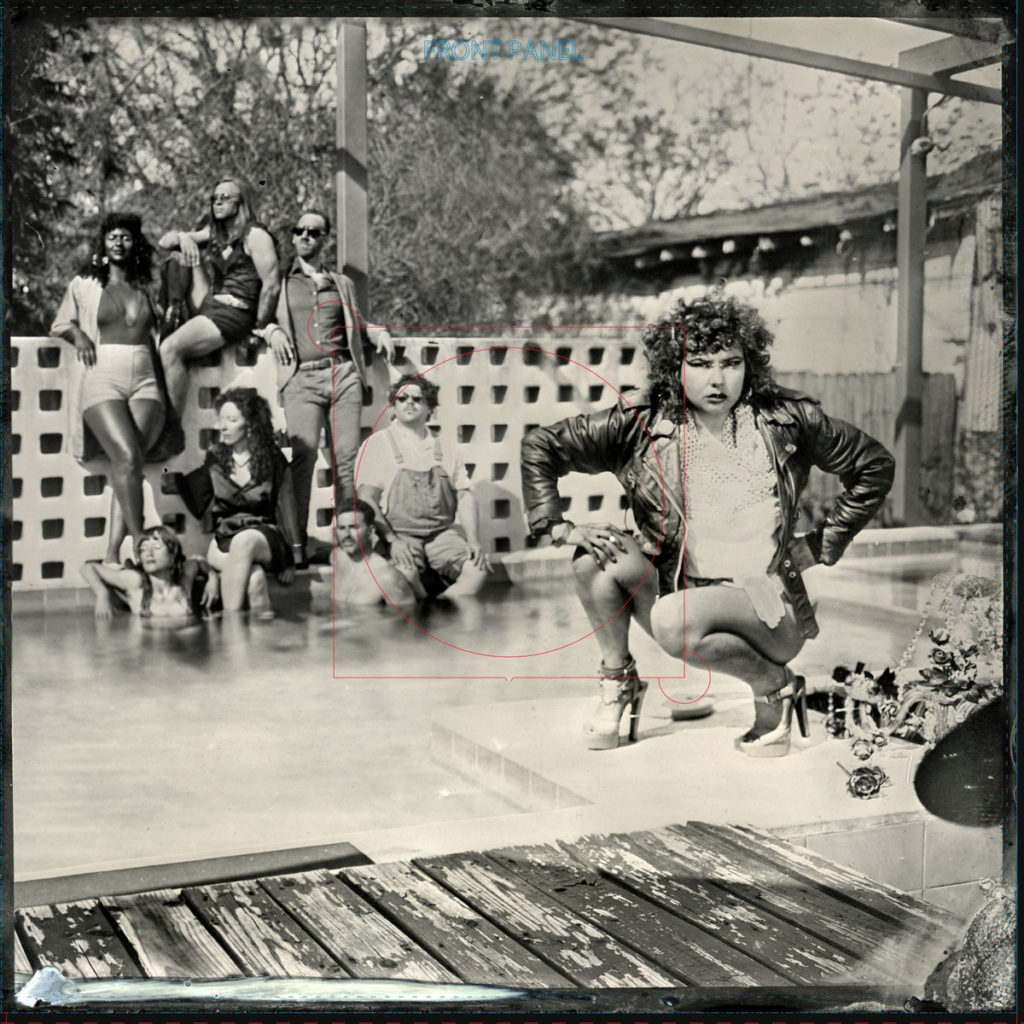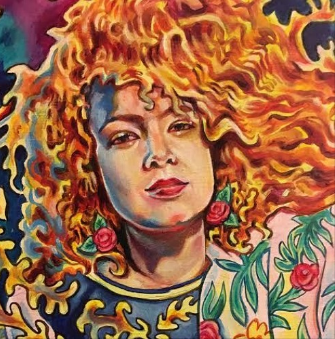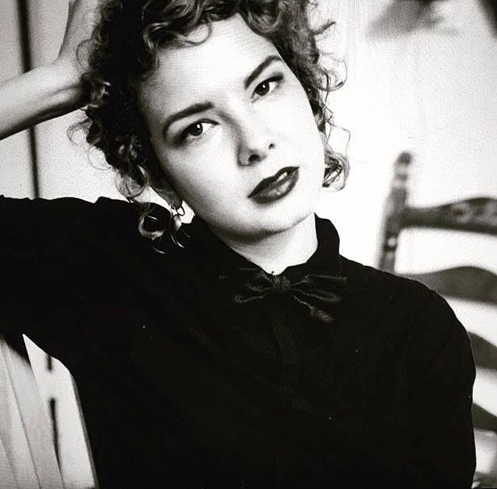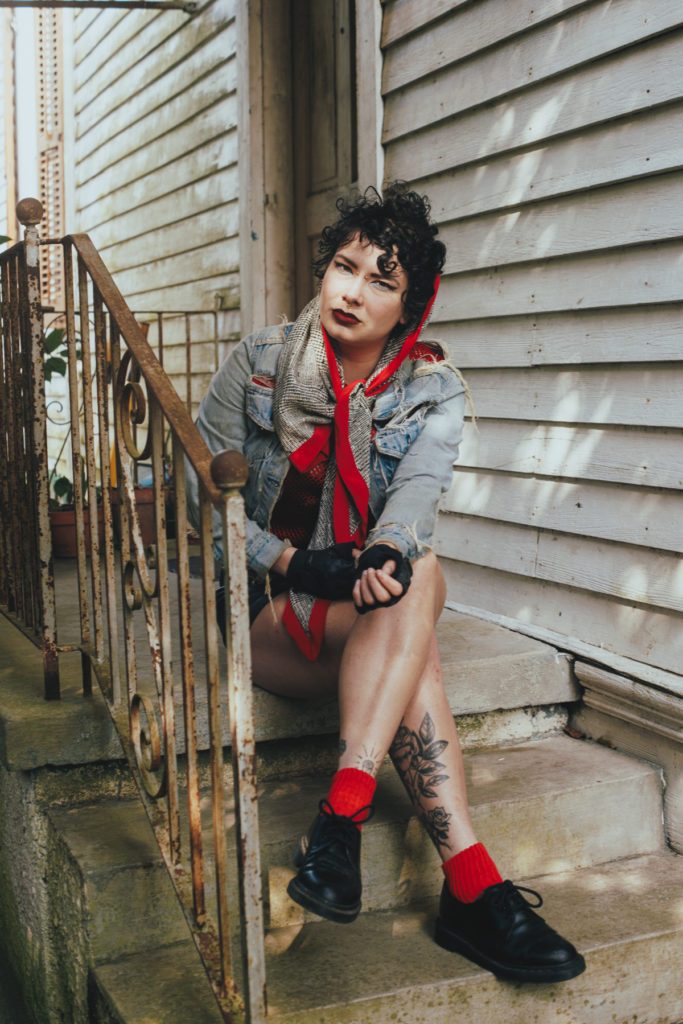Tasche De La Rocha and the Psychedelic “Roaches” can bring serious sounds to a silly space.
In the most literal sense, Tasche and her band were part of a “clown show” at the Joy Theater opening for LSD Clownsystem. Behind them was a massive clown car and psychedelic projections as they performed in zany outfits, ranging from guitarist Dave Hammer—proudly displaying an inflated buttock while shredding—to drummer Neilson Bernard, being drummer Neilson Bernard.
Tasche’s loudest live band which she endearingly calls the “Roaches” performed before a large similarly-clad audience, filling the Joy with their wall of sound. From her command at the front of the stage, Tasche steadily strummed her guitar while belting distinct vocals with impressive range and ability. Gentle croons unraveled into tattered inflections that opened a wormhole into the world and emotions that the band created in their moody setlist.
It’s a strange road that led Tasche to this moment—performing before a circus crowd in the middle of the 2023 New Orleans carnival season. She grew up in the circus, traveling from place to place throughout her childhood. It wasn’t until she was 15 that she’d visit New Orleans for the first time, shortly after Hurricane Katrina. “The city, even in its devastated state, completely spoke to me and changed my entire life,” Tasche said. “I knew I wanted to live here since I was that age.”
The Siren’s Call
Following her NOLA visit, Tasche’s mother noticed a change in her daughter.
“I started singing for the first time immediately after I got back. My mom actually mentioned that to me. I didn’t even notice,” Tasche said.
New Orleans inspired her to begin writing music, though she admits much of it wasn’t very good and was very, very sad. She’d record 4-tracks and slowly began assembling a collection. She’d produced hundreds of tapes, some of which would make it into her earliest CDs. As the years passed, she’d occasionally return to New Orleans and with each visit, she’d find the city beckoning to her more and more.
“I visited a lot and strange things would happen and people, locals would say, ‘You have to move here.’ Somebody made me promise on their cross, on their body, that I would move here. The city just really pulled me in like it does to a lot of people.”
New Orleans and music helped get Tasche through her teenage years into adulthood. She’d treat music as a private endeavor—like something to escape into and meditate with, rarely venturing out and playing in front of others. That began to change once she moved to New Orleans in 2014.
“I started playing on the street and didn’t know how to make a living here. I was forcing myself out of my comfort zone and New Orleans street musicians actually started teaching me how to have more rhythm. And I used to only play like really, really sad songs and people were like, ‘We don’t wanna hear that sad song shit. Add some groove!’” Tasche recalled, laughing.
Like many, Tasche had a difficult life growing up. Moving to New Orleans exposed her to new ideas, ultimately making her a better musician and songwriter who could express tragedy in a more rhythmic and relatable way. She took on the hyper-confident, high-horse persona of the “Gold Rose,” a more perfect version of herself, and then started busking, which marked the beginning of her music career here. She’d play on streets like Decatur, which at the time didn’t have much foot traffic.
“Nobody played at night except for me and this person, Chris Christie, and this person Jordan. It was just the three of us keeping that street alive at night,” she said, “I didn’t really play on Royal or [busk] in the daytime where everybody’s fighting over the same spot. It was a different approach, more romantic. Let people come to you, non-abrasive.”
She’d give away CDs of original music on the street that were still in line with her melancholic, melodic style before adopting a different approach when playing live. It didn’t take long for Tasche to be absorbed into the music scene, meeting people in both oddball DIY spaces and in more traditional New Orleans circles. She’d play her first gig at Siberia and started working towards her first studio album Gold Rose.
The Review
Gold Rose was well-received, but OffBeat’s review by Rob Fontenot was attacked on social media as being misogynistic and negative (an opinion not shared by OffBeat‘s female publisher). Although the conversation on negative reviews in music journalism is an ongoing one, this particular review stirred up controversy. As Tasche put it, writer Fontenot, “didn’t really write about my music.” The review stated that “Her latest effort actually manages to replicate the atmosphere of a little girl all alone in the big city, right up to and including the shrieking silences that surround her and the industrial musique concrète that connects the tracks. The effect is less modern Hollywood rom-com and more like Charlie Chaplin discovering Paulette Goddard capering around the ruins of the new Gilded Age, a gamine with a backstory and an intriguing persona to boot. Most of these adorkable twee-porn practitioners come on as deep as Facebook memes, but here you feel the very real desperation and sadness behind the doe eyes. So if you see Tasche out on the street struggling to get by, slip her some money. Better yet, tag along with her. She’s impossible to write off for long.”
“It was just so incredibly condescending like, ‘Throw her a dollar. She’s desperate on the street.’” Tasche said, “I was literally trying to get off of the street because I was working there every day, you know? I guess people would see my street performance and think that’s what I’d do. But that was my hustle. That was how I made my money and I knew what people wanted, so I played in a certain way on the street. I think that people kind of got that mixed up with my art. It was my day job. I was reviewed for my day job and that was very weird.” (Listen to de la Rocha’s Gold Rose album on Spotify).
Like many other musicians and bands making their first album, for Tasche’s first record, she had gone all-out: fundraising to pay for studio time, hired a manager to promote it (which likely led to the review) and other expenses. “I put everything I had into that album. I worked on it for a couple of years,” said de la Rocha, “I was very broke and made that album out of nothing, thin air… I remember being really excited to read the first review I’ve ever gotten. It took a minute for it to sink in and I was like, ‘That was my first review?’”
As Tasche saw it, her recorded music was separate from the style she would busk.
“I wasn’t trying to like dress old-timey or recreate the past or take credit for the music. I was just very inspired by a certain style of music and was trying to pay homage to it. [I wanted to] embody what I think those people who wrote those songs would want somebody to embody, like Edith Piaf. They would play on the street and give their music away for free. That’s what I was trying to do. But I guess it doesn’t speak to everyone. That’s okay.”
For many young musicians—those like de la Rocha who felt called to move here—New Orleans not only provides thriving art and music scene: it’s a refuge. “I’m not trying to be ‘the lead of transplants,’ I just think that people are attracted to the city naturally. Some people have rough backgrounds and want to be here because it is a city of misfits in some ways. There is a strong community and it’s easy to feel supported here if you belong. So I don’t think there’s anything wrong with people wanting to be here. As long as they’re respectful and want to be part of the community rather than take over and think that they are incredibly valuable to begin with and that people just need to respect them immediately… There’s a lot of that happening for sure. I don’t stand up for that but I think when people want to be part of the community, that’s okay.”
It took time for Tasche to become comfortable with the idea of people purchasing her music. As her career progressed and she began seeing other talented musicians’ work, the value of her music became evident. With hard work also comes mutual respect. Tasche’s hustling is obvious—from her earliest days performing on the street, to the work put into her studio albums, to the sheer quality of her live performance.
“I feel a bit more taken seriously,” she said “I feel like I have earned a place in the community, though, and in a lot of different worlds. I think that there’s some incredible musicians here that I am glad acknowledged me at all and with whom I’ve become closer with over time.”
Make Me a Happy Song
Despite what she considered a rocky recorded debut, Tasche found a local fanbase and the acknowledgment of respected musicians. Starting out as the “Gold Rose,” Tasche felt she needed the “facade of overconfidence” to survive in the music world here. Now she could shed the mask and return with a new album and a more authentic persona. She had been writing and developing new material since before the official release of her debut album. Not only that, but she had a committed band she called the “Psychedelic Roses” to arrange and to expand the music.
However, as many timelines leading into the 2020s also tended to skew plans, the COVID-19 pandemic put a hold on more recordings.
“We wanted to record a long time ago, but I just wasn’t ready. So I took the pandemic as an opportunity to really put the fire under my ass and just do it,” Tasche explained, “I pulled in a lot of people from all over the states to get involved in that album, so it was a lot of wrangling and rehearsing the songs so we could play them live.”
De la Rocha and her band began recording her sophomore LP in the famous “Studio in the Country”, 70 miles northeast of New Orleans in Bogalusa, where artists like Ani DiFranco, Cyril Neville, Dr. John, Stevie Wonder and countless other big names have recorded. With the help of producer Eric Heigle, Tasche could step into play—rather than produce and arrange as she had done leading up to final recording process. Inspired by ‘70s punk, Nina Hagen, David Bowie and psych-horror producer Joe Meek, the record would blend a variety of styles and moods into a dynamic release.
“[Joe Meek] includes a lot of horror in his ’50s recordings. He invented spring reverb and he makes a lot of explosion sounds, dark screams and silliness,” she said and continued explaining why the album released on Halloween, “I was trying to include that playfulness and some kind of Halloween sounds and vibes. Chaos, you know?”
From ‘50s doo-wop and classic jazz to surf rock and grunge, this album rarely plays it straight. Her fascination with vintage styles is balanced with twists of synths and modern effects. When she speaks about the goal of the album, she describes it almost as if the listener were experiencing a rollercoaster, having a clear beginning and end but a rowdy journey in between.
“I think that music used to have a different approach and you would release something as a whole entire story,” Tasche said, “I like to have an entire cascade and take people on a ride.”
When approaching the lyrics and art for the album, Tasche remembered back to “sad song” advice she learned while starting out in New Orleans. “I definitely like dark humor and play-on-words and making sad songs into things that people want to have a psychedelic dance to,” she explained, “like really, really fucked-up subjects that I try put a light on so that it subliminally goes into people’s minds. We’re all dancing and having so much fun, but I guess I’m manipulating people.”
On the surface, a particularly powerful song, “Blue Window” illustrates loss with mundane imagery, and crescendos into huge sonic peaks and valleys. It’s one of the Rocha’s oldest composed songs.
“The person I wrote it about is one of the most brilliant musicians I’ve ever met. He started becoming schizophrenic later. This song is about losing somebody in a romantic sense but also losing them in a mental sense too. I wrote it in a cold attic on a Saturday.”
All the while, New Orleans bled into the music of the record. From the celebration of tragedy in early jazz and other genres to the catharsis of the local DIY/punk music, Tasche found a way to survive the music scene here.
“The city has been through a lot of punches and horrible things have happened here. It survives a lot,” Tasche explained, “I feel like the whole entire city to me has a feminine energy… Everybody says ‘she’ when they talk about New Orleans, like ‘She is gonna take you or she’s gonna hate you,’ or ‘She’s gonna chew you up and spit you out’ or ‘She’s gonna love you like a siren.’”

The cover to Tasche de la Rocha & The Psychedelic Roses by Tasche de la Rocha, her sophomore studio album.
Tasche writes many of her songs in the third person to describe the people in her songs with “she/her” pronouns to describe the experience in a more relatable way. She says sexism is an inescapable struggle as a woman but she never approaches a song as writing a “feminist song.” As the bio for her new album so succinctly points out, it is an album that “believes women and opens a window to the opposite side of a man’s world.”
NOLA has had more than its fair share of powerful women. Indomitable figures like Marie Laveau, Oretha Castle Haley and Mahalia Jackson immediately come to mind. It’s an inspiring place with an inspiring history that seeps into the art made by those with the sense to allow it. De La Rocha is just one of many artists living here, crafting music and capturing the female experience of the city while also continuing its legacy.
“I do believe in women in the music industry and in general. I believe they’re very powerful. So I try to create that feminine power in the music.”
Tasche and the Psychedelic Roses’ music is available on all major streaming platforms and available for purchase here.








